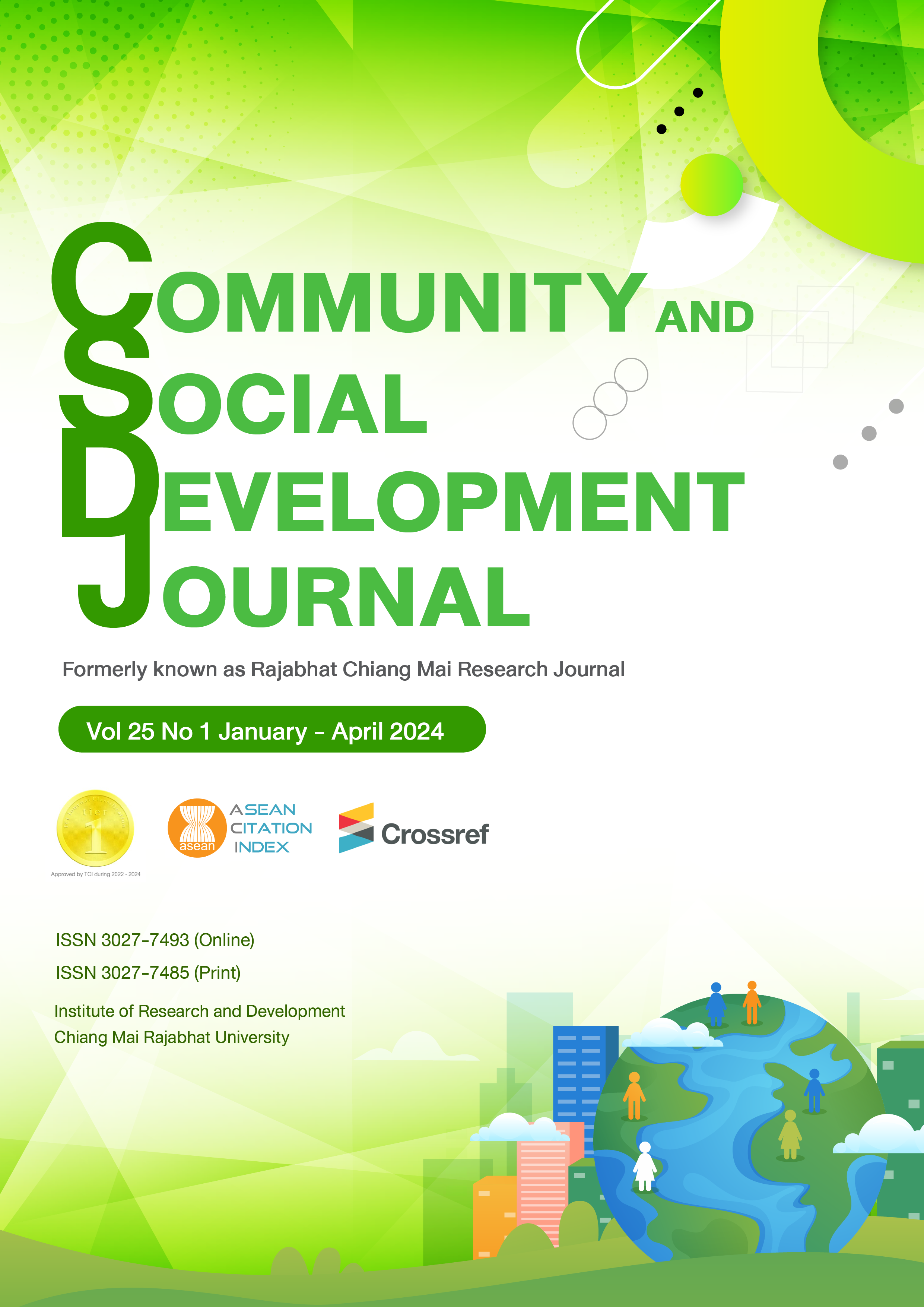The Conditions and Guidelines of Action Learning Resources Through Miang Indigenous Wisdom in Mae Kampong Village, Chiang Mai Thailand
DOI:
https://doi.org/10.57260/rcmrj.2024.265527คำสำคัญ:
Action learning resources, Miang indigenous wisdom, Mae kampong village, Chiang mai thailandบทคัดย่อ
The objectives of this qualitative research were to study the conditions of the action learning resources through Miang indigenous wisdom in Mae Kampong Village, Chiang Mai Thailand, key informants consisted of twenty-six respondents, the instrument used was an unstructured interview form, the data were analyzed by content analysis and summarized into issues, and to study guidelines of the action learning resources through Miang indigenous wisdom in Mae Kampong Village, Chiang Mai Thailand; key informants consisted of twenty-five respondents, the data were analyzed by classifying into items. The research results were as follows: 1. The conditions of the action learning resources through Miang indigenous wisdom in Mae Kampong Village, Chiang Mai Thailand consisted of six aspects including 1.1 The social structure of Mae Kampong Village, Chiang Mai Thailand, 1.2 Ways of life, livelihood, and local wisdom, 1.3 Occupations and living, 1.4 Miang planters as an occupation, 1.5 Characteristics, and 1.6 Economics. 2. Guidelines of action learning resources through Miang indigenous wisdom to promote creative education in Mae Kampong Village, Chiang Mai Thailand consisted of the strengths, weaknesses, opportunities, and threats of the action learning resources applying as derived data to construct a model of action learning resources through Miang indigenous wisdom in Mae Kampong Village, Chiang Mai Thailand.
Downloads
เอกสารอ้างอิง
Bateman, K. (2022). 10 pieces of wisdom for 2022 from indigenous leaders around the world. Retrieved from https://www.weforum.org/agenda/2022/01/wisdom-indigenous-leaders -world-2022-climate-change/
Chinwong, D., Charaj, P., Panitsupakamol, P., Chankaew, T., Chinwong, S., Saenjum, C. (2021). Local Wisdom of Miang Lifestyle and Community for Sustainable Development in Northern Thailand. Sustainability. 13, 7381. DOI:10.3390/su13137381
Interatep, S., Sripuna, S., & Cherdgotha, P. (2017). State of Problems and Development of Local Herbs Consumption Wisdom Transfer for Green Living in The Community, Srakaew Province. VRU Research and Development Journal Humanities and Social Science, 12(1), 275-285. Retrieved from https://so06.tci-thaijo.org/index.php/vrurdihsjournal/article/ view/97835/78407
Kotler, P., Veronica W., John S., & Gary A. (2005). Principles of Marketing. (4th ed). New Jersey: Pearson Prentice-Hall.
Matchimabura, N. (2020). The Promotion of Citizenship-Awareness and Service Learning. Journal of Association of Professional Development of Educational Administration of Thailand, 2(1), 41-48. Retrieved from https://so04.tci-thaijo.org/index.php/JAPDEAT/article/view/261264/176803
Ministry of Tourism & Sports. (2021). Ban Mae Kampong. Retrieved from https://thailandtourismdirectory.go.th/en/attraction/297distinctivefeature
Muenjaem, S. (2021). The Consciousness Raising in Preserving of Miang Pa Pae Local Wisdom through the Participatory Learning Management Integration. Rajabhat Chiang Mai Research Journal, 22(3), 223–239. DOI:10.14456/rcmrj.2021.242745
Office of the National Economic and Social Development Board, Office of the Prime Minister, Thailand. (2017). The Twelfth National Economic and Social Development Plan (2017–2021). Retrieved from
https://www.nesdc.go.th/ewt_dl_link.php?nid=9640
Pakkantorn, R., & Ounvichit, T. (2017). The Quest for a Community Learning Management Model for Informed Environmental Decisions. International Journal of Behavioral Science, 12(1), 111-124. Retrieved from https://so06.tci-thaijo.org/index.php/IJBS/article/download/75890/pdf_50/181263
Rattanachuchok, P. (2016). Application of Information Technology for Studying Conservation of Local Wisdoms in the Area of Muang Kaen Pattana Municipality, Mae Taeng District, Chiang Mai Province. Rajabhat Chiang Mai Research Journal, 17(1), 69–80. DOI:10.14456/rcmrj.2016.214852
Rizal, A., Riyadi, A., Haryanti, Aliah, R.S., Prayogo, T., Prayitno, J., Purwanta, W., Susanto, J.P., Sofiah, N., Djayadihardja, Y.S.; Ikhwanuddin, M., Wahyono, S., Yudo, S., Sachoemar, S.I. (2022). Development of Sustainable Coastal Benchmarks for Local Wisdom in Pangandaran Village Communities. Sustainability, 14(21), 14648. DOI:10.3390/su142114648
Teeranon, P., Phrueksawatnon, P., & Kaowiwattanakul, S. (2021). UNESCO Factors
Affecting Building Phayao Learning City of Thailand: An Opinion from the Senior Citizens. MFU Connexion: Journal of Humanities and Social Sciences, 10(1), 91-103. DOI: 10.14456/connexion.2021.8
Thai Government Gazette. (2017). Thailand’s 20–Year National Strategy (2017- 2036). Retrieved from http://www.ratchakitcha.soc.go.th/DATA/PDF/2561/A/082/T_0001.PDF
The Bureau of Registration Administration (BORA). (2021). Ban Maekampong. Retrieved from https://stat.bora.dopa.go.th/stat/statnew/statMONTH/statmonth/
Tomma, P. (2018). Community Environmental Management. Retrieved from http://community.onep.go.th/location/ban-mae-gom-pong-chiangmai/
Wunthong, B. (2016). The Effect of Using Activities Model for Youth’s Life skill Development in 21st Century by Local Wisdom in The Area of PhlaiChumphon, Muang Phitsanulok. Journal of Faculty of Education Pibulsongkram Rajabhat University, 3(2), 77-85. DOI:10.14456/2016.7
ดาวน์โหลด
เผยแพร่แล้ว
รูปแบบการอ้างอิง
ฉบับ
ประเภทบทความ
สัญญาอนุญาต
ลิขสิทธิ์ (c) 2024 วารสารวิจัยราชภัฏเชียงใหม่

อนุญาตภายใต้เงื่อนไข Creative Commons Attribution-NonCommercial-NoDerivatives 4.0 International License.
1. บทความ ข้อมูล เนื้อหา รูปภาพ ฯลฯ ที่ได้รับการตีพิมพ์ใน “Community and Social Development Journal” ถือเป็นลิขสิทธิ์ของ Community and Social Development Journal มหาวิทยาลัยราชภัฏเชียงใหม่ และเพื่อให้เผยแพร่บทความได้อย่างเหมาะสมผ่านสื่อสิ่งพิมพ์และอิเล็กทรอนิกส์ ผู้เขียนยังคงถือครองลิขสิทธิ์บทความที่ตีพิมพ์ภายใต้ใบอนุญาต Creative Commons Attribution (CC BY) ซึ่งอนุญาตให้เผยแพร่บทความซ้ำในแหล่งอื่นได้ โดยอ้างอิงต้องอ้งอิงบทความในวารสาร ผู้เขียนต้องรับผิดชอบในการขออนุญาตผลิตซ้ำเนื้อหาที่มีลิขสิทธิ์จากแหล่งอื่น
2. เนื้อหาบทความที่ปรากฏในวารสารเป็นความรับผิดชอบของผู้เขียนบทความโดยตรง ซึ่งกองบรรณาธิการวารสารไม่จำเป็นต้องเห็นด้วยหรือร่วมรับผิดชอบใดๆ














